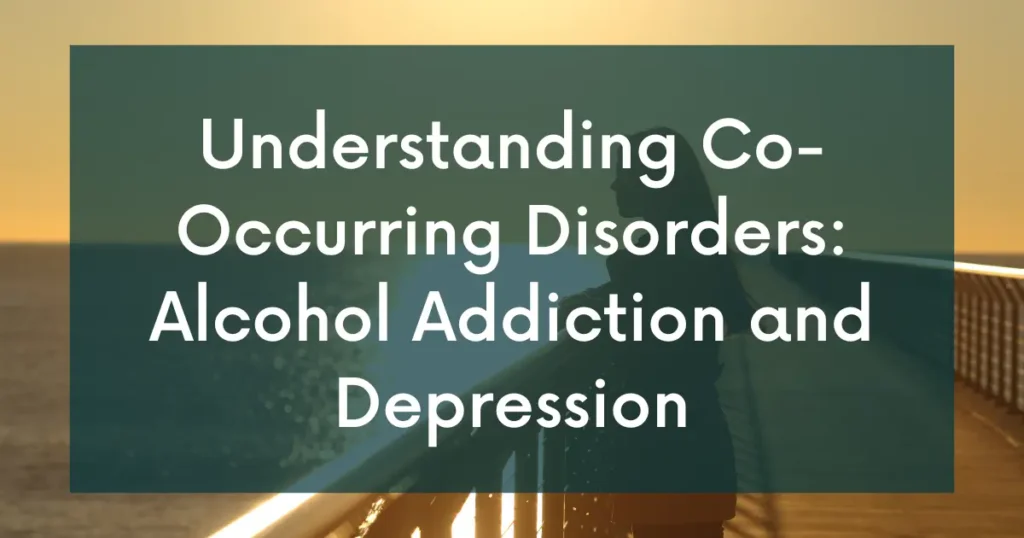
Understanding Co-Occurring Disorders: Alcohol Addiction and Depression
Understanding Co-Occurring Disorders: Alcohol Addiction and Depression
How Integrated Care at Amend Treatment Offers a Path to Recovery
What Are Co-Occurring Disorders?
Co-occurring disorders, also known as dual diagnoses, refer to the presence of both a mental health condition and a substance use disorder in the same individual. According to the Substance Abuse and Mental Health Services Administration (SAMHSA), approximately 9.2 million adults in the U.S. experience co-occurring disorders each year.
These conditions often interact in complex ways: substance use may worsen mental health symptoms, and mental health conditions can drive individuals to self-medicate with drugs or alcohol. Effective treatment must address both conditions simultaneously.
The Connection Between Alcohol Addiction and Depression
Alcohol use disorder (AUD) and major depressive disorder (MDD) are among the most common co-occurring conditions. According to the National Institute on Alcohol Abuse and Alcoholism (NIAAA), about one-third of people with major depression also have alcohol use disorder.
Why Do Alcohol Addiction and Depression Often Co-Occur?
There are several reasons why these two conditions frequently overlap:
- Self-medication: Individuals with depression may use alcohol to numb emotional pain or temporarily improve mood.
- Neurochemical effects: Alcohol is a central nervous system depressant and can worsen depressive symptoms over time.
- Shared risk factors: Both conditions are influenced by genetic, environmental, and psychological factors.
Risks of Untreated Co-Occurring Alcohol Use and Depression
When left untreated, the combination of alcohol addiction and depression can lead to:
- Increased risk of suicidal ideation and behavior
- Greater difficulty maintaining employment and relationships
- Higher rates of relapse if only one disorder is treated
How Amend Treatment Helps People Recover from Alcohol Addiction and Depression
At Amend Treatment, we take a comprehensive and individualized approach to co-occurring disorders, ensuring that clients receive integrated care in a serene, supportive residential treatment setting.
- Integrated Dual Diagnosis Treatment – Our clinical team is trained in dual diagnosis care, meaning clients receive treatment for both alcohol use disorder and depression at the same time. This integrated model improves long-term outcomes and reduces relapse risk.
- Evidence-Based Therapies – We use a combination of proven therapies tailored to each individual’s needs:
- Cognitive Behavioral Therapy (CBT) to reframe negative thought patterns
- Dialectical Behavior Therapy (DBT) to build emotional regulation skills
- Medication-assisted treatment (MAT) when appropriate, overseen by our psychiatric team
- Holistic and Trauma-Informed Care – Because trauma is often a root cause of both addiction and depression, Amend Treatment also incorporates:
- Somatic therapies
- Mindfulness and meditation practices
- Creative and expressive arts therapies
- Nutritional and wellness support
- Ongoing Support and Aftercare Planning – Recovery doesn’t end when residential treatment concludes. Our care team collaborates with each client to create a customized aftercare plan that may include outpatient therapy, sober living, and support group referrals.
Frequently Asked Questions (FAQs)
What are the symptoms of co-occurring alcohol addiction and depression?
Common signs include persistent sadness or hopelessness, increased alcohol use, difficulty functioning in daily life, irritability, sleep issues, and withdrawing from relationships or responsibilities.
Can you treat depression if someone is still drinking?
While it’s possible to begin therapy, the most effective treatment involves addressing both disorders at once. Ongoing alcohol use can interfere with depression treatment and increase symptom severity.
How long does residential treatment for co-occurring disorders last?
Programs typically last 30 to 60 days, depending on the individual’s clinical needs and progress. Amend Treatment’s residential program provides flexible, personalized care plans tailored to each client’s journey.
A Path to Healing at Amend Treatment
Recovery from alcohol addiction and depression is possible with the right care. At Amend Treatment, we specialize in helping individuals heal from the inside out through integrated, compassionate, evidence-based residential care. If you or a loved one is struggling with co-occurring disorders, contact us today to learn more about how we can help.
We are here for you.
Feel free to reach out to us to start your journey or if you have any questions. We’re here to assist you and look forward to connecting with you soon.
Admissions – (866) 726-0226
[email protected]
